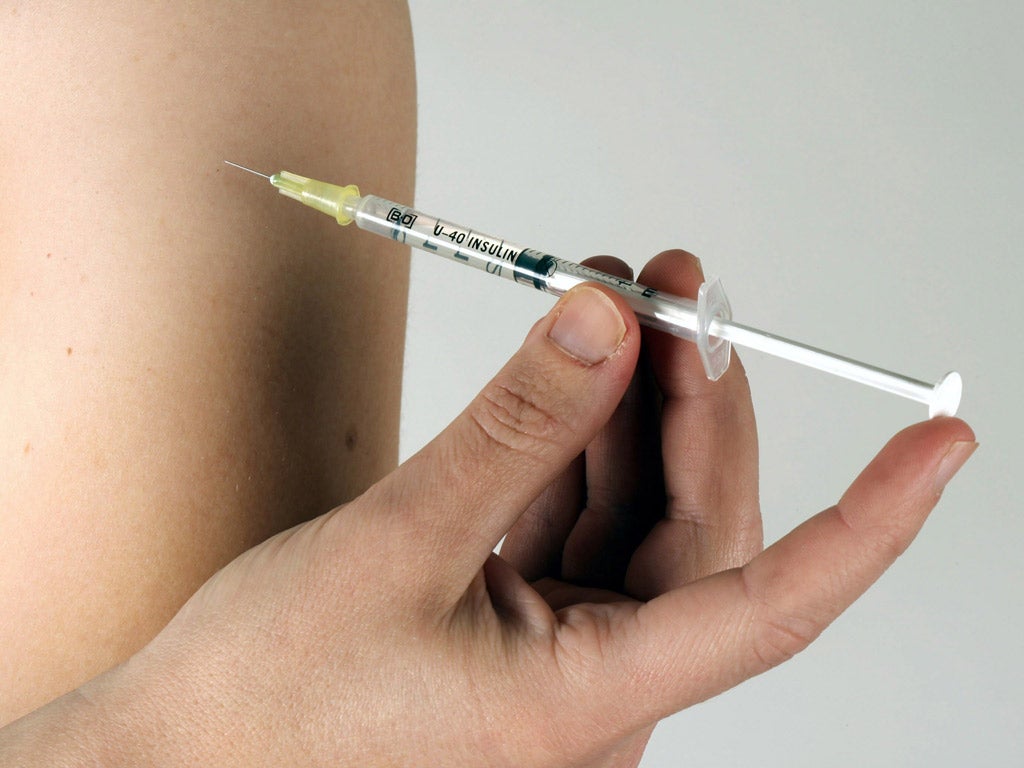Diabetes timebomb: Only half of NHS patients receiving acceptable care

Your support helps us to tell the story
From reproductive rights to climate change to Big Tech, The Independent is on the ground when the story is developing. Whether it's investigating the financials of Elon Musk's pro-Trump PAC or producing our latest documentary, 'The A Word', which shines a light on the American women fighting for reproductive rights, we know how important it is to parse out the facts from the messaging.
At such a critical moment in US history, we need reporters on the ground. Your donation allows us to keep sending journalists to speak to both sides of the story.
The Independent is trusted by Americans across the entire political spectrum. And unlike many other quality news outlets, we choose not to lock Americans out of our reporting and analysis with paywalls. We believe quality journalism should be available to everyone, paid for by those who can afford it.
Your support makes all the difference.Sweeping variations in standards of care for diabetic patients is costing thousands of lives and wasting tens of millions of pounds every year, the government’s spending watchdog reveals.
Less than half the people with diabetes in England receive all the recommended health checks which would reduce the risk of serious complications such as blindness, amputations and kidney disease.
In some regions, only 6 per cent of patients received the nine basic health checks, which monitor patients for tissue damage, compared to 69 per cent in the highest-achieving primary care trusts (PCTs), according to the National Audit Office (NAO) report.
Around 24,000 people in England die from avoidable diabetes complications every year, but the variations in care standards mean a person’s risk of being admitted to hospital or dying from diabetes significantly depends on where they live.
The worst offenders were Mid Essex and Swindon PCTs where less than 9 per cent of patients were given the nine basic tests, including blood tests, retina screening and foot examinations, recommended by the Department of Health since 2001 and the National Institute of Clinical Excellence.
But not a single primary care trust carried out all the health checks recommended for diabetic patients, in essence playing Russian roulette with blindness, amputations, stroke and kidney disease.
In addition, less than one in five patients achieve the safe levels for glucose, blood pressure, and cholesterol, which are all known to increase the risk of diabetic complications.
The report strongly suggests that the DH has failed to get a handle on the spiralling costs of diabetes. According to the NAO’s conservative estimate, diabetes cost the NHS in England £3.9bn in 2009/20 – three times the government’s official figures.
Detecting potential problems earlier, by carrying out the health checks and treating people in the community, would save the NHS £170m every year by slashing hospital admissions, according to the NAO.
“[From] the low achievement of treatment standards and high number of avoidable deaths we conclude that diabetes services in England are not delivering value for money,” the report concludes.
The DH is also criticized for failing to get a grip of the problem nationally and for not holding poorly performing PCTs to account.
The number of people with diabetes doubled between 1994 and 2009 to 3.1million. This is expected to rise by a further 23 per cent by the end of this decade. Nine out of 10 cases have type 2 diabetes, the risk of which increases with age and is strongly linked to obesity and ethnicity.
Amyas Morse, head of the NAO, said: "The DH has failed to deliver diabetes care to the standard it set out in 2001. This has resulted in people with diabetes developing avoidable complications, in a high number of preventable deaths and in increased costs for the NHS.
"The expected 23 per cent increase by 2020 in the number of people in England with diabetes will have a major impact on NHS recourses unless the efficiency and effectiveness of existing services are substantially improved."
Barbara Young, chief executive of Diabetes UK, said the report was a “damning indictment” of the current approach to diabetes.
“Much of the colossal amount of money being spent on it is being wasted. Escalating diabetes costs threaten to wreck the NHS budget so this is an issue that affects all of us, not just people with diabetes.”
Care Services Minister Paul Burstow said the NAO report confirms what the Coalition already know. "By exposing poor practice and shining a light on best practice we are determined to drive up standards for everyone. We are already working on a new outcomes strategy covering long term health conditions and are committed to publishing a companion document on diabetes later this year"
Join our commenting forum
Join thought-provoking conversations, follow other Independent readers and see their replies
Comments